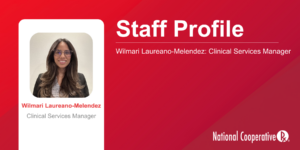In case you missed it, National CooperativeRx produced its second webinar of our new quarterly series this week that featured our Clinical Services Manager Jocelyn Kerl, PharmD., BCPS, educating the audience on biologic drugs and regulatory implications, the current market status of biosimilars and other highlights plan sponsors should know.
Helpful Definitions to Know
Biologic Medication: a diverse category of products that are generally large, complex molecules used to diagnose, prevent, treat, or cure disease. Examples would be therapeutic proteins or vaccines.1
Biosimilar: a biologic medication that is highly similar to and has no clinically meaningful differences from an existing FDA-approved reference product.1
Interchangeable Biosimilar: a biologic medication that is similar to an existing FDA-approved reference product and the product meets additional standards for interchangeability.1
Biosimilar Regulatory Landscape
It may be surprising to some that the development of biosimilars is fairly recent, with Europe being ahead of the U.S. by almost a decade. What we should learn from this is that biosimilars can be interchangeable and education is extremely important for uptake.
2005: European Medicines Agency guidance on biosimilars issued.
2006: First biosimilar approved in Europe.
2009: World Health Organization issued guidance on biosimilar development.
2015: First biosimilar approved in the U.S.
2020: 64 biosimilars approved in Europe and 29 approved in the U.S., with only 20 marketed.
Implications of More Biosimilars
As more biosimilars enter the U.S. market, there will be many potential effects, such as higher competition and lower prices. Manufacturers will likely increase the rebate value associated with originator products to maintain formulary preference or placement. Existing contracts may also provide value or impact savings. For example, AbbVie, the manufacturer of Humira, also produces Rinvoq™ and Skyrizi™.
How Plan Sponsors Can Increase Biosimilar Adoption
Formulary Management: Ensure your plan is aligned to the specialty formulary. CVS Caremark has given preference to a growing number of biosimilars over time and additional biosimilar products will be given preference for July 1, 2021. Being aligned to the formulary helps ensure plan participants are being directed to the most cost-effective therapies. As many of these are medical benefit drugs, ask your medical vendor how it is managing and promoting biosimilar utilization under the medical benefit.
Sound Plan Design: One way to encourage the use of preferred products over non-preferred specialty products is to move to a six-tier plan design. Using co-insurance instead of copays is another great way to promote consumerism, as this ensures cost sharing remains stable as price inflation occurs.
Plan Participant and Provider Education: It may be difficult for patients to understand how biosimilars are different from generics. Click here for some great resources from the FDA that will help explain the concept. CVS Caremark also offers tools that raise awareness of medication costs for prescribers at the point of prescriber, at the pharmacy, and for members at caremark.com. And while patient education and acceptance are crucial, utilization of biosimilars ultimately begins with the prescriber. In a 2014 study of over 400 prescribers, over 90% of respondents requested continuing education on biosimilars.2




